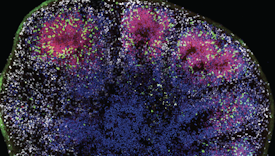Ranmal Samarasinghe is an assistant professor at the David Geffen School of Medicine at the University of California, Los Angeles (UCLA). He is a practicing clinical scientist with medical training in adult neurology and subspecialty training in clinical neurophysiology. He completed his postdoctoral training in the laboratory of Bennett Novitch at UCLA, where he helped develop organoid models of Rett syndrome. In 2020, he started his own laboratory at UCLA.
Samarasinghe’s research is focused on the development and utilization of human brain organoid and assembloid models to characterize neural circuit development and function. His research group has been developing brain assembloid preparations, electrophysiological recording techniques and analytical approaches to better understand how high-risk genetic variants for autism and epilepsy alter circuit development and activity.


